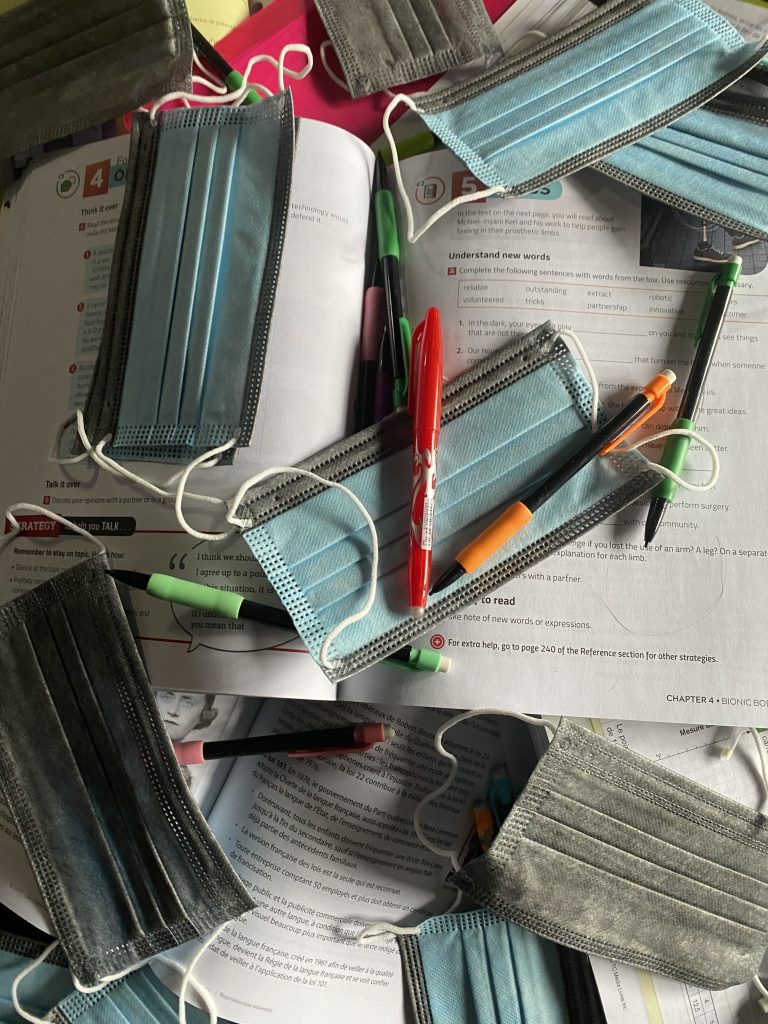The Legault government has loaded a large burden on young people’s shoulders, using them to justify its dubious decisions while simultaneously blaming them for the spike in COVID cases.
By Sarah Guilbault
The way that youth are often depicted, as portrayed by news media, often reflects neither the diversity of their opinions nor the whole of their reality.

The Legault government—and, all-too-often, journalists—pigeonhole students as though all students shared the same viewpoint. Many feel alienated from decisions that will have a profound impact upon their future. They want a voice, and they want to be heard.
“Secondary 3, 4 and 5 students throughout Quebec will be in school daily and that, for me, is really good news, because that’s where our children ought to be,” Quebec Premier François Legault stated, March 23.
The Legault government claims to listen, understand and to know what they need. Many students believe the opposite. High-school students continue to confront constantly changing rules and class schedules. They find themselves in a stressful situation that it’s impossible to adapt to.
“It’s really hard to follow schedules that constantly change. It’s exhausting to always have to change your routine.”
• Amelys, 15, Red Zone
“It might work in theory, but honestly, the constant changes give me a headache. One day at home; the next at school, it makes it hard to cope.”
• Pénélope, 16, Red Zone
For students to succeed at their studies, they need a safe, stable environment, no matter whether the pursue their studies at home or in class.
“Without enough support, we have to cope with many things at once, which makes it hard to learn.”
• Chloé, 16, Red Zone
According to the Legault government, all students want to go back to school.
“It’s going to have a huge impact on academic success, on mental health. We’re working on it we’re working swiftly to make it happen,” stated Education Minister Jean-François Roberge, March 9.
Many high-school students still find the Legault government’s decisions on their behalf risky and make some of them anxious about the health of their family.
“The lockdown affected my mental health [like many youth] but going back to school was worse. I felt like my mental health was in freefall due to the stress and worry about everything.”
• Naïka, 15, Red Zone
“Opening schools right now is like playing with fire. It’s like saying to someone a beach where big breakers constantly roll in: ‘Oh, the wave is gone, or it has calmed down, so go build a sand castle on the shore.”
• Mahdi, 16, Red Zone
Many students would prefer to continue their studies online from home. They find it disconcerting to have to manage two environments at once. Few youths wanted movie theatres to reopen. Many who participate in organized sports would prefer to wait before team sports resume.
“Each time we seen the number of cases fall, the government decides to reopen restaurants, movie theatres and so forth. That might let us go back to normal life, but they often prove bad decisions [in my view] and we never make any progress.
I feel really helpless, faced with this situation. We’re forced to go to school, despite the many risks. I’m in Secondary 4, the most important year, I have to go, otherwise my school year goes down the drain.”
• Bailin, 16, Red Zone
Don’t forget that many students are also highly stressed and worried about the prospect of going back to class. The Legault government spotlights the students who want to return to school while ignoring the opinions and well-being of the others.
School is a microcosm of society. Just like adult society, you find some young people there who don’t believe in the virus, some who are anti-mask and others who fear for their health.
No one would imagine forcing 1,000 employees to work at close together in cramped, dilapidated, poorly-ventilated quarters—while we force students who aren’t allowed to leave the school building if they don’t feel safe, without even the opportunity to complain about unsafe safety standards. It would be better to stop blaming youths whenever case counts start climbing, when they’re simply trying to do their best to follow the rules.
“We’re taking a degree of risk, with respect to the Red Zone, where Secondary 3, 4 and 5 students will attend school daily, but we figure that it’s a risk worth taking, because it will have an impact on young people’s learning, socialization and mental health,” stated Dr. Horacio Arruda, March 23.
“There are too many people in the same place at the same time. Even if they implemented measures to reduce the number of cases, I think that sending everyone [back to school] will only make a bad situation worse.”
• Max, 15, Red Zone
“Most of the rules meant to protect us are contradictory. We have to keep our distance in class, but once we’re in the schoolyard or even on the stairs, we’re all jammed together. It’s even worse, given that all students are now back at school.”
• Amelys, 15, Red Zone
Students are forced follow rules that endanger them and puts protecting their family’s health on their shoulders—a huge responsibility to bear. While Minister Roberge insisted, January 12, that there would be no compromise on student safety, we now learn that masks distributed in the schools are toxic and that much-vaunted ventilation studies were neither conducted nor validated by the public health service.
Since the outset of the pandemic, students have been flexible, have adapted to a host of changes and have faced as many, if not more, restrictions as adults with all of the efforts that they have undertaking, and all they ask is to have a choice as to whether they study online at home or at school.